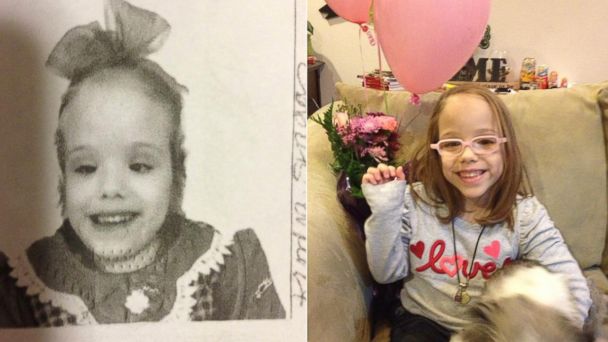'Last' Russian Orphan Blossoms in US Home

Undergoing multiple surgeries for spina bifida, 5-year-old Polina Skaggs is pictured before and after. Courtesy Kendra Skaggs
MOSCOW - What a difference a year makes. And love and care, too.
Last January, Polina Skaggs was a 5-year-old Russian orphan with spina bifida caught in a geopolitical minefield.
After Russia cut off adoptions to the United States in December 2012, her adoption by an American family, already approved by the Russian government, was upended. For weeks it was unclear whether she would be allowed to leave the country. Finally, she was one of the last, if not the last, Russian orphan to be allowed out.
In her orphanage in the town of Dmitrov, about 45 miles outside Moscow, she was dismissed as an "invalid." The stigma of disabilities in Russia that likely landed her there often left her isolated and ignored by caregivers. Two broken legs went untreated.
Today, Polina is thriving. She has friends and goes to school in her new home in Arkansas. Her development is now on track.
"The change in her body, in her skin, and her hair, the thickness of her hair, is just incredible. Just how much healthier she is just based on nutrition and being with a family," her adoptive mother Kendra Skaggs said. "It makes all the hard times worth it."
And they were very hard times in the beginning. Polina threw tantrums nearly every day.
"She had self-mutilating behaviors. She, especially at bedtime, would bite herself, spit, kick, rip my necklaces off. Just very difficult transition times and attachment issues," Kendra recalled. "She was really just trying to pass on the pain that she felt inside of her to me."
But things gradually got easier.
"It was a good 10 months at home before she finally accepted that she's going to be here forever and it's OK to become attached to these people and they aren't going to abandon me," Kendra said. "Now it seems like she has always been in our family."
A year after arriving in America Polina now speaks nearly perfect English. The Skaggs tried to keep up Polina's Russian language skills, but it became too difficult during the transition. Now that things are easier they are taking her to Russian classes twice a month. The Skaggs have also added some Russian recipes to the family cookbook (even though Polina now requests pizza, chocolate and cheese at every meal).
She still talks about her time at the orphanage, but makes it clear she does not want to go back.
In August she had surgery to repair her club foot and last week she went under the knife again to repair damage to her legs after those broken bones went untreated for so long.
Kendra Skaggs is a special education teacher and recognizes that Polina is one of the lucky ones. She has founded a group called Polina's Promise to bring professional therapists from abroad to train Russian caregivers and families on how to deal with children with special needs. With adoptions still banned, she sees it as the only way to help those orphans with disabilities left behind. Many wallow in facilities ill-equipped to deal with their special needs.
"I just feel like I owe that community something," Kendra said. The group's first trip to Russia is scheduled for June.
"We really want to change the stigma and let Russian people know that it's a huge challenge to have a kid like this in Russia, but you can do it and this is what it'll do for the child and this is how the child will change your world. For as much as we have changed Polina's world, she has changed our world."
As for Polina, she sailed through her latest surgery and is looking ahead to the summer when she'll go to camp for the first time. She'll also attend a spina bifida convention at Disney Land in California and hopes to go surfing with an organization called Life Rolls On. She rolled a 5K race (with mom pushing most of the way) on New Year's day and wants to do more.
Kendra does not rule out Polina walking one day.
"She could walk with walking canes and bracing. She's pretty determined," she said.
And after that?
"She's going to do something. I have no idea what it is," Kendra said.
Oh, and one more thing. She wants a sister.